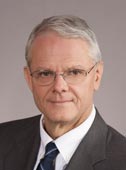Chair's Column:
Surgery Without Borders
Integrated Medical Education at UofT

James Rutka
|
I am honored to have taken over
the responsibility of Chair of the
Department of Surgery this year.
I want to take a moment to again
thank David Latter who served
most capably as interim chair
from May 1st, 2010 March
31st, 2011. Under David's leadership,
our Department not
only grew in size, but thrived
in terms of all metrics applied to academic units such as
ours. Interestingly, one of the most significant changes
in medical education at the University of Toronto which
arose during David's tenure and with which I needed to
be brought up to speed quickly was Integrated Medical
Education (IME).
By now, most of you have heard the term IME as a new
initiative in the Faculty of Medicine at the University
of Toronto. IME refers to the coordination of a sustainable
framework for MD learners and residents into the
expanding repertoire of University of Toronto community
affiliate hospitals. The overarching goal of IME is
to provide new professional standards for accreditation,
education, and clinical care in urban, suburban and community
settings. For many years, our medical students
and residents have benefited from surgical rotations and
experience in these community affiliate hospitals. IME is
the initiative that will formalize the relationship between
our learners and educators at these sites.
Over the past year, the Department Appointments
Committee (DAC) has vetted dozens of applications
for appointments in the Department of Surgery. The
vast majority of these have been in the Adjunct Lecturer
Surgeon-Teacher category. Some of the community
affiliate hospitals where these appointments have been
granted include: Humber River Regional Hospital, the
Royal Victoria Hospital in Barrie, The Scarborough
Hospital, Southlake Regional Health Centre, and Credit
Valley Hospital. The application process for appointments
in the Department of Surgery for surgeons at the
community affiliate hospitals is rigorous and includes a
letter of interest from the candidate, a letter of support
from the Surgeon-in-Chief at the hospital, submission
of a current CV, demonstration of good standing in the
College of Physicians and Surgeons of Ontario, and an
interview with the Chair of DAC, Avery Nathens.
I personally have enjoyed speaking to many of the
Department of Surgery applicants from the IME initiative.
I have been very impressed with the established case
volumes, mix, and expertise that exists in our community
affiliate hospitals in areas such as bariatric surgery,
minimally invasive surgery, thoracic surgery, plastics and
reconstructive surgery to name just a few. As many of
our
|
residents will opt for surgical elective rotations in any
one of a number of our community affiliate hospitals,
I am pleased to report that these experiences continue
to be highly sought after and regarded, thanks to the
outstanding surgical teaching they receive on site. In
addition, many of our resident and fellow graduates will
be looking towards the community affiliate hospitals for
employment opportunities upon completion of their
training in surgery. Of course, our graduates will be keen
to keep an affiliation with the University of Toronto
through this IME initiative in the future.
In case some of you did not know, a new Academy of
Medicine will be opening this fall where our MD learners
will be receiving their education The Mississauga
Academy of Medicine (MAM). MAM is a new partnership
between the University of Toronto and Trillium
Health Centre and Credit Valley Hospital. A key faculty
member at MAM for Surgery is Dr Norman Hill, who
is the Vice President of Medical and Academic Affairs
at Trillium. Norm is a FRCSC-trained General Surgeon
with a certificate in Health Administration from the
University of Toronto. We will be working closely with
Norm as we initiate the educational programs in Surgery
for medical students, residents and fellows.
It is timely for the Department of Surgery to be actively
involved in the IME process. In fact, one can argue
that perhaps this is long overdue. I know of many
Departments of Surgery in countries around the world
where formal linkages with their community affiliate
hospitals has been practiced for decades. This is particularly true in Japan where the Department of Surgery at
a given University may have an affiliation with 30 or
more hospitals across a broad, bordering region. This
relationship leads to outstanding opportunities for crosspollination
with respect to surgical techniques, collaborations
in education, advancement of research trials, and
publications in high impact peer reviewed journals. I
envision the possibility of expanding our reach with best
practices and quality performance in surgery for various
procedures across all divisions in our fully affiliated and
community affiliate hospitals. The power of such collaborative
research would be enormous.
In closing, I welcome our newly appointed faculty
members from the IME initiative. For those of you
who wish to know more about IME at the University
of Toronto, you can visit the Faculty of Medicine
website at: http://www.facmed.utoronto.ca/programs/
Integrated_Medical_Education.htm
James T Rutka, MD PhD, FRCSC
RS McLaughlin Chair
Department of Surgery
|